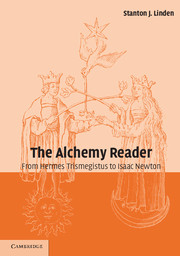Book contents
- Frontmatter
- Contents
- List of illustrations
- Acknowledgments
- List of abbreviations
- Illustrations
- Introduction
- Part I Ancient texts
- 1 HERMES TRISMEGISTUS: The Emerald Table (Tabula Smaragdina)
- 2 PLATO (c. 427-347 BC): From the Timaeus
- 3 ARISTOTLE (384-322 BC): From the Meteorology
- 4 PSEUDO-DEMOCRITUS (first or second century AD): From The Treatise of Democritus On Things Natural and Mystical
- 5 ANONYMOUS (first or second century AD): Dialogue of Cleopatra and the Philosophers
- 6 ANONYMOUS (late third century AD): From Leyden Papyrus X and the Stockholm Papyrus
- 7 ZOSIMOS OF PANOPOLIS (fl. c. 300 AD): Of Virtue, Lessons 1–3
- 8 STEPHANOS OF ALEXANDRIA (first half of seventh century AD): From The Great and Sacred Art of the Making of Gold
- 9 ANONYMOUS (eighth or ninth century AD): The Poem of the Philosopher Theophrastos Upon the Sacred Art
- Part II Islamic and medieval texts
- Part III Renaissance and seventeenth-century texts
- Glossary
- Bibliography
- Index
3 - ARISTOTLE (384-322 BC): From the Meteorology
Published online by Cambridge University Press: 05 October 2014
- Frontmatter
- Contents
- List of illustrations
- Acknowledgments
- List of abbreviations
- Illustrations
- Introduction
- Part I Ancient texts
- 1 HERMES TRISMEGISTUS: The Emerald Table (Tabula Smaragdina)
- 2 PLATO (c. 427-347 BC): From the Timaeus
- 3 ARISTOTLE (384-322 BC): From the Meteorology
- 4 PSEUDO-DEMOCRITUS (first or second century AD): From The Treatise of Democritus On Things Natural and Mystical
- 5 ANONYMOUS (first or second century AD): Dialogue of Cleopatra and the Philosophers
- 6 ANONYMOUS (late third century AD): From Leyden Papyrus X and the Stockholm Papyrus
- 7 ZOSIMOS OF PANOPOLIS (fl. c. 300 AD): Of Virtue, Lessons 1–3
- 8 STEPHANOS OF ALEXANDRIA (first half of seventh century AD): From The Great and Sacred Art of the Making of Gold
- 9 ANONYMOUS (eighth or ninth century AD): The Poem of the Philosopher Theophrastos Upon the Sacred Art
- Part II Islamic and medieval texts
- Part III Renaissance and seventeenth-century texts
- Glossary
- Bibliography
- Index
Summary
Like Plato, Aristotle exerted a long and profound influence on alchemical thought through both his genuine works and the many pseudonymous writings attributed to him. Among the latter, the Secreta Secretorum purported to be a treatise written by Aristotle to his pupil Alexander the Great, but was in fact compiled from Syriac sources in the eighth century, then translated into Arabic, then into Latin in the thirteenth century by Philip of Paris, and from Latin into the modern languages of western Europe. The work's popularity – its diverse topics included the importance of religion, the proper appearance of a king, the principles of wise governing, the means to good health, astronomy, and alchemy – was such that Elias Ashmole included a version of its alchemical content in the Theatrum Chemicum Britannicum of 1652, entitled “John Lydgate Monke of St. Edmunds Bury, In his Translation of the second Epistle that King Alexander sent to his Master Aristotle.”
Among the genuine writings, Aristotle's Meteorology, despite its title, included important material on the “natural” subterranean formation of metals and minerals, and since alchemists believed that their Art imitated Nature, this treatise also became an established text on the artificial production of metals and related matters. In the following selection, Aristotle begins familiarly with the four elements, their “principles” (coldness, moistness, hotness, and dryness), and interconvertibility.
- Type
- Chapter
- Information
- The Alchemy ReaderFrom Hermes Trismegistus to Isaac Newton, pp. 34 - 37Publisher: Cambridge University PressPrint publication year: 2003



